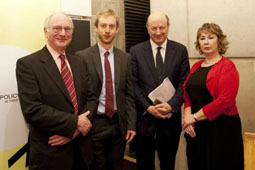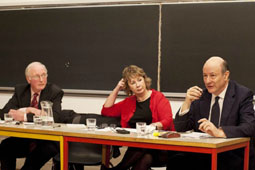Henry Grattan Lecture
-
Speaker: Jan Vincent Rostowski (Minister of Finance and Deputy Prime Minister of the Republic of Poland)
-
Title: Roadmap for recovery in the post-crisis Europe: Cohesion or Division?
-
Date: Thursday 11 April from 7.00 to 9.00pm
-
Venue: JM Synge Theatre, Arts Building, Trinity College Dublin

What are the prospects for stabilisation and recovery in the Eurozone? Jan Vincent-Rostowski, the Polish Deputy Prime Minister and Finance Minister, an economist by training, believes a lessening of the crisis is on the horizon. However, in devising a roadmap for recovery and building the foundations for a robust post-crisis Europe, difficult questions will need to be addressed. What are the fundamental policy prescriptions required for robust recovery? What will be the impact of the 2014-2020 EU budget? Should a higher bar be set for joining the Euro? Key to forging ahead will be generating policy consensus among EU member states. What are the prospects for agreement among all 27 member states? Who will take the lead? As one of the leading European figures in economic policy-making, Minister Rostowski is uniquely placed to provide insight into the economic future of the European project.
The lecture was opened by Prof Jacqueline Hayden (awarded the Knight's Cross of the Order of Merit of the Republic of Poland), and chaired by Prof Ron Hill (Emeritus Professor in Political Science).

The Deputy Prime Minister and Finance Minister of Poland Jan Vincent Rostowski argued that repairing the Eurozone was vital for all member states of the European Union when he addressed TCD’s Policy Institute on Thursday 11th April. He warned that the answer to the question as to whether the Eurozone was destroying the European Union was – not yet! Mr Rostowski said he was convinced that the measures put in place in response to the economic crisis would prevent the same kind of crisis occurring again. In his lecture entitled ‘Roadmap for recovery in the post-crisis Europe: Cohesion or Division?’ Mr Rostowski said that the Eurozone was fragmented and outlined a number of reasons. He said one key problem was the differential cost of credit between member countries, financial protectionism, differences between states on capital control regulation and the North – South divide. According to Mr Rostowski, getting the European periphery out of recession should be the EU’s main priority. He said Poland was a strong supporter of the proposed banking union saying that it may well be critical in resolving the problem of the differential cost of credit which meant that ‘money was going to the wrong countries – to Germany and not to Italy or Ireland’. He also called for the ECB to eliminate financial protectionism. Mr Rostowski said direct action was necessary to reassure markets that no member states of the Eurozone will be allowed to go bust. He called for an IMF style intervention mechanism with policing powers enabling an arms-length relationship between donors and beneficiaries. Mr Rostowski said that Poland must be made fully competitive before joining the Eurozone. He described it as a ‘deeply flawed project’ but that there was no alternative to Polish membership.
- Video Recording - will be available shortly
- Speaker Biographies
Speaker Biographies
Jan Vincent Rostowski
In the early 90s Vincent Rostowski advised the Russian Federation on macroeconomic policy. From 1995 unti 1997 he has been Professor of Economics and the head of the Department of Economics at the Central European University in Budapest during period. During the years 1997 to 2000, Vincent Rostowski was Chairman of the Macro-economic Policy Committee at the Polish Ministry of Finance. He is one of the co-founders of the Center for Social and Economic Research (CASE). From 2002 to 2004 he worked as Economic Advisor to the National Bank of Poland.
Jan Vincent-Rostowski joined the Cabinet of Premier Donald Tusk on 16 November 2007 and currently serves as the Finance Minister of the Republic of Poland. Since 2011 he has been a member of the Polish Parliament. He was named European Finance Minister of the Year in 2009 by The Banker magazine and Finance Minister of the Year 2012 for Emerging Europe by the Emerging Markets magazine.
Vincent Rostowski has published many academic articles concerning European enlargement, monetary policy, currency policy and transformation of the post communist economies.
Jacqueline Hayden
Jacqueline Hayden is an Assistant Professor in the Department of Political Science. She is currently completing her third book, an analysis of the legacy of institutional choices made during the Polish transition after 1989. Before completing her PhD (The Collapse of Communist Power in Poland: Strategic misperceptions and unanticipated outcomes (Routledge: 2006)) she worked as a current affairs journalist and producer for RTE. She received the Provost’s Teaching Award in 2010 and will be awarded the Knight's Cross of the Order of Merit of the Republic of Poland 'for outstanding services rendered to the promotion of Poland's transition to democracy, for acting as a truthful witness to the situation on the ground during the period of martial law and for accomplishments in (her) journalistic undertakings' on June 4th next.
Ron Hill
Ronald J. Hill is a Fellow Emeritus at Trinity College, Dublin, Ireland, where he retired in 2007 from the position of Professor of Comparative Government. He was born in the United Kingdom in 1943 and educated at the Universities of Leeds and Essex; he moved to Dublin in 1969. A specialist on the politics of the former communist world, with a strong interest in questions of national identity, he has published a dozen books (including second, third and foreign-language editions), and more than 80 scholarly articles, chapters and contributions to symposia, many book reviews, and numerous radio, television and newspaper commentaries. He held visiting appointments in the United States, the United Kingdom and the Netherlands, and visited the former Soviet Union on many occasions. He has also travelled widely in the former communist countries of Eastern Europe, including Hungary, Bulgaria, Poland, Czechoslovakia, Belarus, Romania, Moldova and Azerbaijan. He speaks fluent Russian and French, and has knowledge of German and Polish and a reading familiarity with Romanian, and Ukrainian and other Slavonic languages. From 1984 to 2011 he was style and managing editor of the quarterly Journal of Communist Studies and Transition Politics and has served as general editor of several book series. His work has been published in many countries, including the UK, the US, Japan, Italy, Germany, Belarus, South Korea and Indonesia.